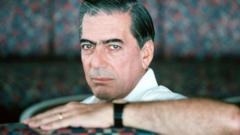Mario Vargas Llosa, the renowned Peruvian author, passed away at 89, leaving behind a complex legacy that intertwined literary brilliance with political controversy.
Mario Vargas Llosa: A Literary Titan of Controversy and Insight

Mario Vargas Llosa: A Literary Titan of Controversy and Insight
A look at the life and legacy of Nobel laureate Mario Vargas Llosa, a defining voice of Latin American literature.
Mario Vargas Llosa, who has passed away at the age of 89 in Lima, Peru, was an iconic figure of Latin American literature, known for his unflinching critique of sociopolitical issues. Over his prolific career, he authored more than 50 novels and essays, winning the Nobel Prize in Literature in 2010 for his "divinely gifted storytelling." His works often confronted themes of authoritarianism, violence, and societal malaises, earning him a central position in the Latin American Boom—the literary movement of the 1960s and 70s that showcased the continent’s vibrant voices to a global audience.
Born in 1936 in Arequipa to a middle-class family, Vargas Llosa's childhood was shaped by parental separation and relocation. His early exposure to trauma at the Leoncio Prado Military Academy led to the publication of his groundbreaking novel, The Time of the Hero (1962), which criticized the corrupt military establishment in Peru, despite backlash from military leaders.
His subsequent novel, The Green House (1966), added to his literary reputation with its layered narrative set against the backdrop of the Peruvian desert, marking a departure into the experimental style characteristic of the Boom authors. Vargas Llosa's fierce rivalry, and eventual reconciliation, with Gabriel García Márquez highlighted the depth of literary camaraderie and conflict during this epoch.
The author transitioned from leftist sympathies to a more conservative stance, culminating in his unsuccessful presidential run in 1990. Key works like Conversations in the Cathedral (1969) and The Feast of the Goat (2000) emphasized the oppressive nature of authoritarian regimes in Latin America. His involvement in the Uchuraccay massacre investigation sparked significant debate and criticism regarding his perspectives on violence and governmental accountability.
Vargas Llosa continued to engage with contemporary issues, although his remarks often invited criticism, especially his controversial views on feminism and freedom of the press. In addition to his literary pursuits, his personal life drew attention, including a well-publicized relationship that followed his long marriage.
Despite these complexities, Vargas Llosa's death marks the end of an era for Latin American literature. His relentless inquiry into societal truths and the human condition leaves an indelible mark on literary history, affirming his status as one of the most significant figures of his time.



















